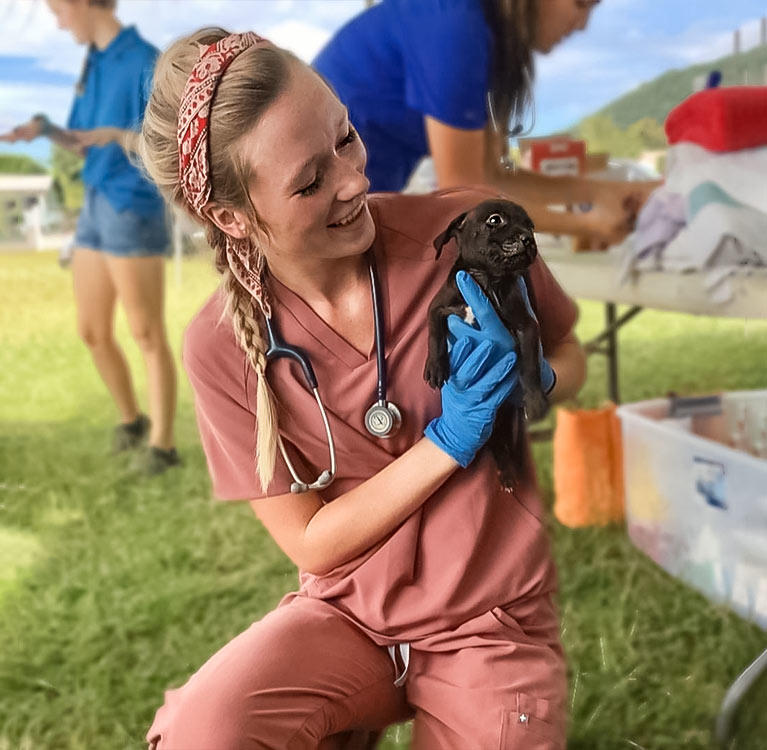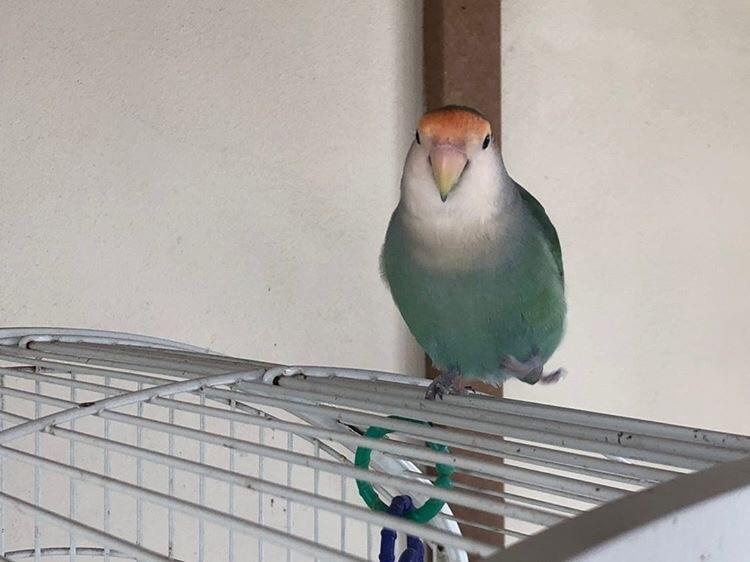Your vet school personal statement is a crucial part of a successful vet school application. The statement tells your story, shares your values and goals, and introduces the person behind the transcripts and test scores.
Your veterinary personal statement is an opportunity to tell your story and make yourself stand out from the crowd. Applying to an accredited veterinary program — such as Ross University School of Veterinary Medicine* (Ross Vet) — can seem a bit daunting at times. But with a few helpful hints, you may feel more confident to begin your application and the vet school personal statement — a sometimes undervalued element of the application package. Transcripts and scores tell your academic story; the vet school essay reveals who you are. It also shows how you differ from other applicants.
VMCAS PERSONAL STATEMENT TIPS
1. Give Yourself Time.
Most students apply for vet school through the Veterinary Medical College Application Service (VMCAS), but you should prepare your VMCAS personal statement well in advance. Good writing takes time. Demonstrate your communication skills, which play an important part in how applicants — and veterinarians — are evaluated. Students must speak and write well in vet school. As for veterinarians, clear, concise communication can help speed a life-saving treatment or calm the frayed nerves of a pet owner. So yes, give your VMCAS essay careful consideration, and get started long before it’s time to submit.
2. Remember Your Audience.
Make your VMCAS essay personal, but remember who is reading it: an admissions committee often made up of doctors of veterinary medicine (DVMs). You want your veterinary personal statement to stand out against a crowded field of applicants. Writing that you love animals and have wanted to be a vet ever since you were a kid, for example, is too common and superficial. You should demonstrate a love of medicine in general and a curiosity about the science of veterinary medicine in particular. After all, you will be a doctor who treats animals, not a vet tech or assistant. Describe your desire to be a DVM. Perhaps it’s your calling. And remember that your VMCAS essay won’t be read in isolation — it will be compared to many others. You may need to dig deep to write a memorable essay.
3. Hook Your Reader.
A “narrative hook” is a literary device that catches a reader’s attention at the very beginning of a story — and isn’t that what you want to do on your vet school personal statement? Start the essay with a catchy story, quote, or memory — perhaps the moment you realized you wanted to be a veterinarian more than anything else. Or it could be some other experience that helped guide you to that realization, or even some unrelated significant and transformational moment altogether. The point is to make the reader want to keep reading.
4. Highlight Your Experiences.
After putting the hook in the reader, you’ll want to keep them on the line. Flesh out your relevant and unique experiences; explain your background and expertise. Show how life has prepared you for the academic and psychological challenges of vet school. Remember that you’re applying to get a doctoral degree, so go easy on the cutesy charm and don’t overshare. The admissions committee doesn’t need gory or emotional details. Be concise, mature, and — above all — interesting.
5. Articulate Personal Growth.
Your VMCAS personal statement details your journey. You may have fallen out of the crib loving animals, but it took time and mature decision-making to decide to become a veterinarian. Vets are doctors, and it’s not all about cuddles: Doctors have to make tough decisions, perform necessary procedures, and often share heartbreaking news with owners who cherish their pets. Your mature growth should be on display — you’ll need it both as a student and as a DVM. The admissions committee knows this better than anyone; they’ll be looking for it.
6. Define Your Values and Aspirations.
Your VMCAS personal statement should illustrate your passion, commitment, and values. What makes you happy? What drives you to excel? What makes you excited for the future? What makes you feel satisfied at the end of the day? And on the other hand, what failures or shortcomings have kept you awake at night? Recognizing your faults — admitting that you have them — shows maturity, particularly if you feel you’ve overcome them. Don’t distract the admissions committee with trite or common misadventures. Make your points significant, but keep them brief and purposeful.
7. Show, Don’t Tell.
Without boasting or self-congratulation, showcase the qualities you have that will make you a good student and a good vet. Demonstrate your compassion, dedication, and maturity — perhaps your calm in times of distress. But don’t just say you’re intelligent, for example; show it: I love organic chemistry! If you’ve already mentioned an experience elsewhere in your application, perhaps you can expand on it here to further show the occasion’s significance and lasting effect on you.
8. Avoid Assumptions and Overgeneralizations.
Remember your audience — the admissions committee — but be careful not to make unwarranted assumptions. Don’t say: “It’s rare to find a vet applicant like me who has a background in engineering.” Is it rare? Rather, explain how a background in engineering gives you a unique perspective on veterinary medicine, or an advantage in problem-solving. Let the reader decide how rare or exciting something is, even if you grew up among a pride of lions.
9. Conclude With a Vision.
Sum up your experience to show what a well-rounded vet school applicant you are. Show how your background, personality, and passion make you an ideal candidate. You want the admissions committee to believe you will succeed in both vet school and the veterinary profession. And lay out your vision for the future: What veterinary specialties interest you? What is the main purpose behind your desire to be a veterinarian? Is your aim to help individual animals, communities, or something bigger? Also be quick to admit that the way you feel right now, as an applicant, may change as you go along. You are passionate, well-intended, and open and eager to expand your horizons.
10. Proofread and Enlist Help.
Check your vet school personal statement for errors several times. You might be surprised how often students undermine their VMCAS essay with misspellings and grammatical errors. Take care with medical and technical terminology. Misspellings and bad grammar reduce your credibility, as do misused terms. To help catch errors, enlist others as proofreaders. A fresh set of eyes can spot mistakes or other problems that you may have missed.
What Do You Need for Your Ross Vet Application?
At Ross Vet, a personal essay is required as part of your application. If applying through VMCAS, the personal statement will be accepted as your essay. There is no set of rules mandating what a strong personal statement should include, but here are a few more tips to help you successfully craft an effective and winning personal statement:
- Discuss how you would contribute to the profession and animal care.
- Explain why you are a good candidate for veterinary school. In a pile of 100 applications, does your statement stand out?
- Convey your passion for veterinary medicine.
- Avoid repeating information from your transcripts or reference letters.
- Ask yourself if this essay is a good representation of your character, ideals, and aspirations.
Notice how the prompts focus on your values, goals, and individual qualities. Vet school is a formidable academic challenge that requires perseverance and drive. Highlight your personal values, your dedication, and the contributions you hope to make to veterinary medicine and the larger world. But do not just talk about your values. The best VMCAS personal statements show how values have been gained through experiences, volunteer work, relationships, and personal growth.
Now that you’ve read our vet school personal statement tips, get to work on that essay! For motivation, check out Ross Vet and learn more about our DVM program, our campus, and the island of St. Kitts that we call home. It may just inspire you to apply for admission! Ross Vet provides an accelerated, broad-based curriculum that integrates unique research opportunities, classroom study, and hands-on experiential learning. Feel free to contact us with any questions.
Related Resources:
- Tips for Preparing a Strong Vet School Application
- VMCAS Letter of Recommendation: How To Obtain It
- DVM Degree Program Admissions
* Ross University School of Veterinary Medicine confers a Doctor of Veterinary Medicine (DVM) degree, which is accredited by the American Veterinary Medical Association Council on Education (AVMA COE), 1931 N. Meacham Road, Suite 100, Schaumburg, IL 60173, Tel: 800.248.2862. For more information please visit https://www.avma.org/education/accreditation-veterinary-colleges.
The AVMA COE uses defined standards to evaluate veterinary medical education programs, including facilities, clinical resources, curriculum, faculty, student outcomes and research programs. The standards are interpreted and applied by the AVMA COE- accredited veterinary medical education programs in relation to its mission.






